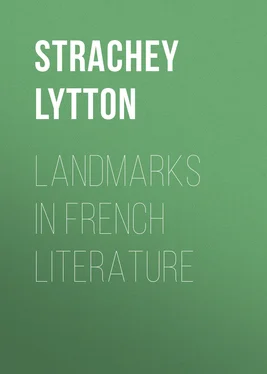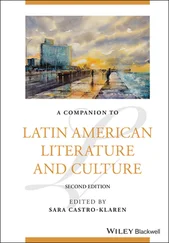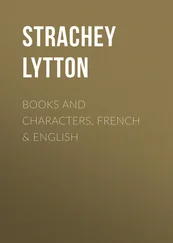Lytton Strachey - Landmarks in French Literature
Здесь есть возможность читать онлайн «Lytton Strachey - Landmarks in French Literature» — ознакомительный отрывок электронной книги совершенно бесплатно, а после прочтения отрывка купить полную версию. В некоторых случаях можно слушать аудио, скачать через торрент в формате fb2 и присутствует краткое содержание. Жанр: Языкознание, foreign_antique, foreign_prose, Зарубежные любовные романы, на английском языке. Описание произведения, (предисловие) а так же отзывы посетителей доступны на портале библиотеки ЛибКат.
- Название:Landmarks in French Literature
- Автор:
- Жанр:
- Год:неизвестен
- ISBN:нет данных
- Рейтинг книги:4 / 5. Голосов: 1
-
Избранное:Добавить в избранное
- Отзывы:
-
Ваша оценка:
- 80
- 1
- 2
- 3
- 4
- 5
Landmarks in French Literature: краткое содержание, описание и аннотация
Предлагаем к чтению аннотацию, описание, краткое содержание или предисловие (зависит от того, что написал сам автор книги «Landmarks in French Literature»). Если вы не нашли необходимую информацию о книге — напишите в комментариях, мы постараемся отыскать её.
Landmarks in French Literature — читать онлайн ознакомительный отрывок
Ниже представлен текст книги, разбитый по страницам. Система сохранения места последней прочитанной страницы, позволяет с удобством читать онлайн бесплатно книгу «Landmarks in French Literature», без необходимости каждый раз заново искать на чём Вы остановились. Поставьте закладку, и сможете в любой момент перейти на страницу, на которой закончили чтение.
Интервал:
Закладка:
In sheer genius Pascal ranks among the very greatest writers who have lived upon this earth. And his genius was not simply artistic; it displayed itself no less in his character and in the quality of his thought. These are the sides of him which are revealed with extraordinary splendour in his Pensées —a collection of notes intended to form the basis for an elaborate treatise in defence of Christianity which Pascal did not live to complete. The style of many of these passages surpasses in brilliance and force even that of the Lettres Provinciales . In addition, one hears the intimate voice of Pascal, speaking upon the profoundest problems of existence—the most momentous topics which can agitate the minds of men. Two great themes compose his argument: the miserable insignificance of all that is human—human reason, human knowledge, human ambition; and the transcendent glory of God. Never was the wretchedness of mankind painted with a more passionate power. The whole infinitude of the physical universe is invoked in his sweeping sentences to crush the presumption of man. Man's intellectual greatness itself he seizes upon to point the moral of an innate contradiction, an essential imbecility. 'Quelle chimère,' he exclaims, 'est-ce donc que l'homme! quelle nouveauté, quel monstre, quel chaos, quel sujet de contradiction, quel prodige! Juge de toutes choses, imbécile ver de terre, dépositaire du vrai, cloaque d'incertitude et d'erreur, gloire et rebut de l'univers!' In words of imperishable intensity, he dwells upon the omnipotence of Death: 'Nous sommes plaisants de nous reposer dans la société de nos semblables. Misérables comme nous, impuissants comme nous, ils ne nous aideront pas; on mourra seul.' Or he summons up in one ghastly sentence the vision of the inevitable end: 'Le dernier acte est sanglant, quelque belle que soit la comédie en tout le reste. On jette enfin de la terre sur la tête, et en voilà pour jamais.' And so follows the conclusion of the whole: 'Connaissez donc, superbe, quel paradoxe vous êtes à vous-même. Humiliez-vous, raison impuissante; taisez-vous, nature imbécile … et entendez de votre maître votre condition véritable que vous ignorez. Écoutez Dieu.'
Modern as the style of Pascal's writing is, his thought is deeply impregnated with the spirit of the Middle Ages. He belonged, almost equally, to the future and to the past. He was a distinguished man of science, a brilliant mathematician; yet he shrank from a consideration of the theory of Copernicus: it was more important, he declared, to think of the immortal soul. In the last years of his short life he sank into a torpor of superstition—ascetic, self-mortified, and rapt in a strange exaltation, like a medieval monk. Thus there is a tragic antithesis in his character—an unresolved discord which shows itself again and again in his Pensées . 'Condition de l'homme,' he notes, 'inconstance, ennui, inquiétude.' It is the description of his own state. A profound inquietude did indeed devour him. He turned desperately from the pride of his intellect to the consolations of his religion. But even there—? Beneath him, as he sat or as he walked, a great gulf seemed to open darkly, into an impenetrable abyss. He looked upward into heaven, and the familiar horror faced him still: 'Le silence éternel de ces espaces infinis m'effraie!'
CHAPTER IV
THE AGE OF LOUIS XIV
When Louis XIV assumed the reins of government France suddenly and wonderfully came to her maturity; it was as if the whole nation had burst into splendid flower. In every branch of human activity—in war, in administration, in social life, in art, and in literature—the same energy was apparent, the same glorious success. At a bound France won the headship of Europe; and when at last, defeated in arms and politically shattered, she was forced to relinquish her dreams of worldly power, her pre-eminence in the arts of peace remained unshaken. For more than a century she continued, through her literature and her manners, to dominate the civilized world.
At no other time have the conditions of society exercised a more profound influence upon the works of great writers. Though, with the ascendancy of Louis, the political power of the nobles finally came to an end, France remained, in the whole complexion of her social life, completely aristocratic. Louis, with deliberate policy, emphasized the existing rigidity of class-distinctions by centralizing society round his splendid palace of Versailles. Versailles is the clou to the age of Louis XIV. The huge, almost infinite building, so stately and so glorious, with its vast elaborate gardens, its great trees transported from distant forests, its amazing waterworks constructed in an arid soil at the cost of millions, its lesser satellite parks and palaces, its palpitating crowds of sumptuous courtiers, the whole accumulated mass of piled-up treasure and magnificence and power—this was something far more significant than the mere country residence of royalty; it was the summary, the crown, and the visible expression of the ideals of a great age. And what were these ideals? The fact that the conception of society which made Versailles possible was narrow and unjust must not blind us to the real nobility and the real glory which it brought into being. It is true that behind and beyond the radiance of Louis and his courtiers lay the dark abyss of an impoverished France, a ruined peasantry, a whole system of intolerance, and privilege, and maladministration; yet it is none the less true that the radiance was a genuine radiance—no false and feeble glitter, but the warm, brilliant, intense illumination thrown out by the glow of a nation's life. That life, with all it meant to those who lived it, has long since vanished from the earth—preserved to us now only in the pages of its poets, or strangely shadowed forth to the traveller in the illimitable desolation of Versailles. That it has gone so utterly is no doubt, on the whole, a cause for rejoicing; but, as we look back upon it, we may still feel something of the old enchantment, and feel it, perhaps, the more keenly for its strangeness—its dissimilarity to the experiences of our own days. We shall catch glimpses of a world of pomp and brilliance, of ceremony and decoration, a small, vital passionate world which has clothed itself in ordered beauty, learnt a fine way of easy, splendid living, and come under the spell of a devotion to what is, to us, no more than the gorgeous phantom of high imaginations—the divinity of a king. When the morning sun was up and the horn was sounding down the long avenues, who would not wish, if only in fancy, to join the glittering cavalcade where the young Louis led the hunt in the days of his opening glory? Later, we might linger on the endless terrace, to watch the great monarch, with his red heels and his golden snuff-box and his towering periwig, come out among his courtiers, or in some elaborate grotto applaud a ballet by Molière. When night fell there would be dancing and music in the gallery blazing with a thousand looking-glasses, or masquerades and feasting in the gardens, with the torches throwing strange shadows among the trees trimmed into artificial figures, and gay lords and proud ladies conversing together under the stars.
Such were the surroundings among which the classical literature of France came into existence, and by which it was profoundly influenced in a multitude of ways. This literature was, in its form and its essence, aristocratic literature, though its writers were, almost without exception, middle-class men brought into prominence by the royal favour. The great dramatists and poets and prose-writers of the epoch were in the position of artists working by special permission for the benefit and pleasure of a select public to which they themselves had no claim to belong. They were in the world of high birth and splendid manners, but they were not of it; and thus it happened that their creations, while reflecting what was finest in the social ideals of the time, escaped the worst faults of the literary productions of persons of rank—superficiality and amateurishness. The literature of that age was, in fact, remarkable to an extraordinary degree for precisely contrary qualities—for the solidity of its psychological foundations and for the supreme excellence of its craftsmanship. It was the work of profound and subtle artists writing for a small, leisured, distinguished, and critical audience, while retaining the larger outlook and sense of proportion which had come to them from their own experience of life.
Читать дальшеИнтервал:
Закладка:
Похожие книги на «Landmarks in French Literature»
Представляем Вашему вниманию похожие книги на «Landmarks in French Literature» списком для выбора. Мы отобрали схожую по названию и смыслу литературу в надежде предоставить читателям больше вариантов отыскать новые, интересные, ещё непрочитанные произведения.
Обсуждение, отзывы о книге «Landmarks in French Literature» и просто собственные мнения читателей. Оставьте ваши комментарии, напишите, что Вы думаете о произведении, его смысле или главных героях. Укажите что конкретно понравилось, а что нет, и почему Вы так считаете.












